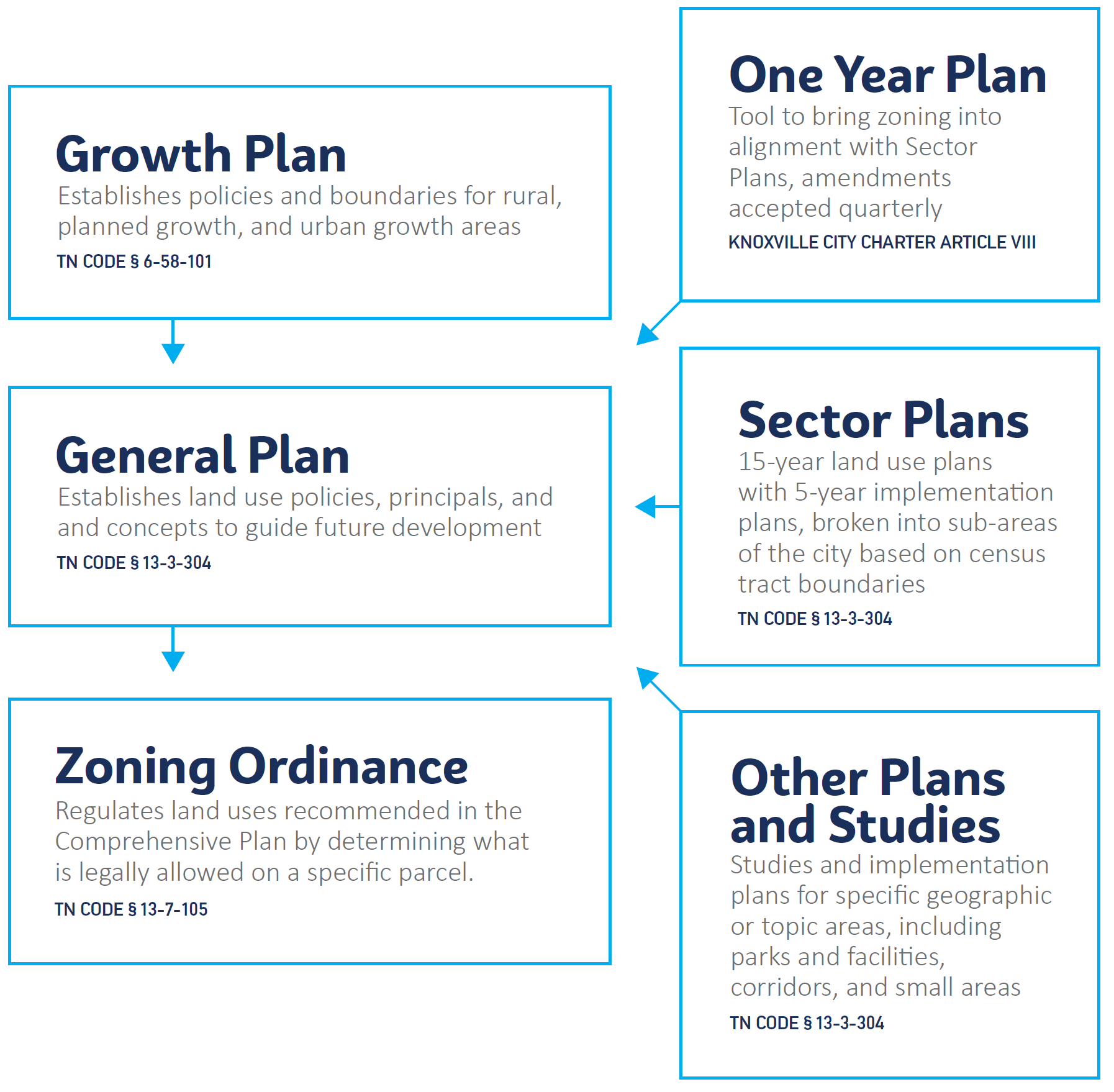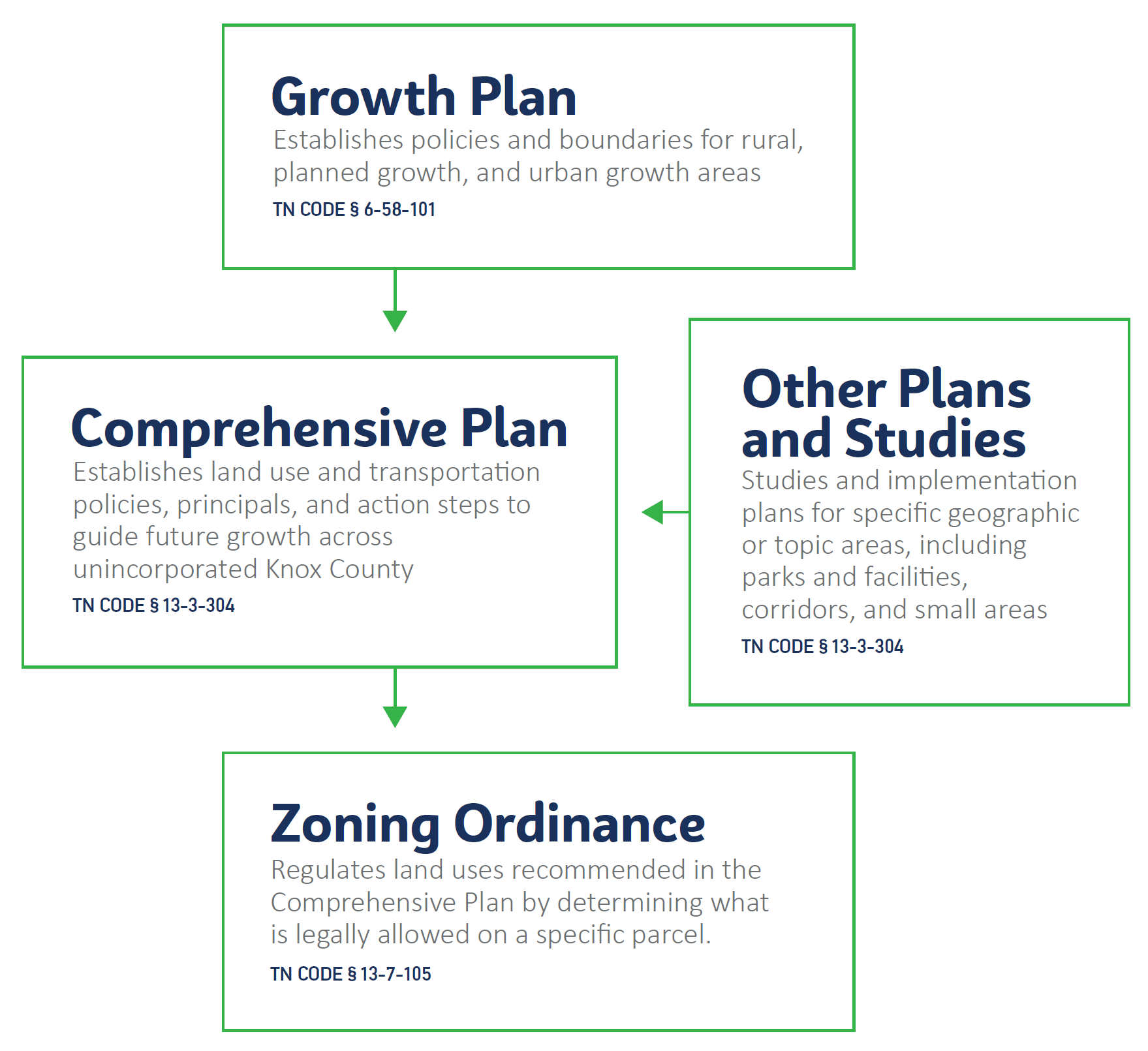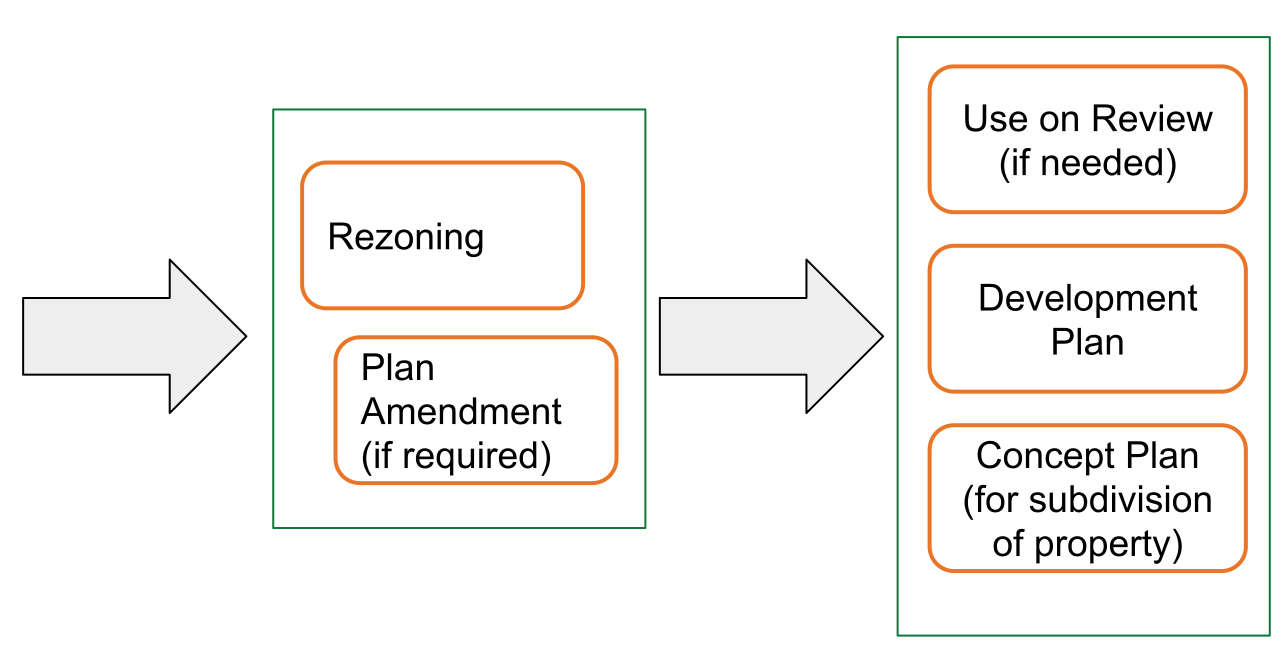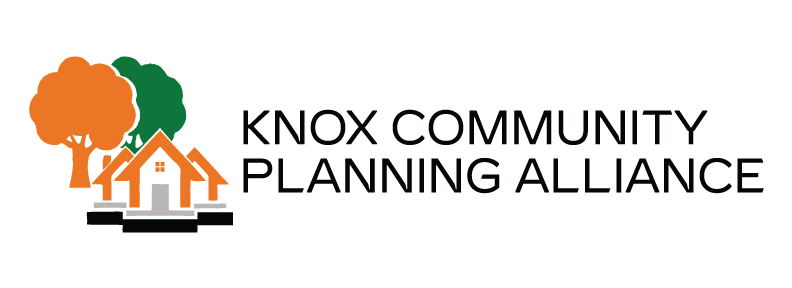Learn
Here's where you can find lots of helpful information about planning, zoning, development and related topics.
How do I get started?
Here’s a checklist we use when we are working on a land use issue that you may find helpful to understand what is involved.
Step 1 – Learn!
Use the information below to learn about the process and what you can do to support or oppose a project.
Step 2 – Organize!
Organize your team to give yourself the best chance of success. You will need to organize your neighbors, decide if you need to hire an attorney, and get support from other neighborhood groups.
Step 3 – Advocate!
Plan a campaign to advocate for your position. Reach out to the developer, to the planning staff, to commissioners, to neighbors and other supporters with a clear message and requested actions.
Introduction to Land Use and Planning Framework
Knox County and the City of Knoxville established Knoxville-Knox County Planning (formerly known as the Metropolitan Planning Commission, and referred to as “Knox Planning” for the rest of this article) in 1956 as the agency responsible for their comprehensive planning and subdivision regulations. The Town of Farragut has a Planning & Zoning Division (“Farragut Planning” for the rest of this article) that administers the town’s planning documents, zoning ordinance and subdivision regulations.
The planning framework consists of five components:
- Knox County Growth Plan – a 20 year plan identifying urban growth boundaries for municipalities (Knoxville, Town of Farragut), the county’s Planned Growth Area, and the couty’s Rural Area. State law requires each county to have a growth plan, and it is adopted by and binds county government (Knox County) and all munipalities in the county (City of Knoxville, Town of Farragut).
- Regional / Municipal General Plans – a plan that guides and coordinates future land use. This is the “To Be” or desired state, and usually has a horizon of 20 or 30 years. State law requires zoning and land use decisions to be consistent with the general plans. Knoxville and Knox County Plans, Farragut Comprehensive Plan
- Zoning regulations (zoning ordinance) detail a variety of zoning districts, uses permitted and certain specifications for building and other site improvements. A property’s zone describes the rights a property owner has. Zoning ordinances and maps are legislative actions.
- Subdivision regulations govern the subdivision of land. Knoxville and Knox County, Farragut
- Additional design and development guidelines are adopted for central Knoxville, Historic areas, and other districts. These guidelines assist staff and board members with evaluating specific plan submissions. Farragut also has some design standards on their website.
Knox Planning publishes charts of how the documents work together in the City of Knoxville and unincorporated Knox County. These are so helpful that we republish the images here:

Plan Relationships – City of Knoxville

Plan Relationships – unincorporated Knox County
Every piece of property is associated with a Growth Plan classification, a Future Land Use classification, and has an associated “zone”. To locate designations for a specific piece of property, you can use the interactive features on KGIS Maps.
If someone wants to do something on their property that does not fit with the existing zone, they must make an application with the either Knoxville-Knox County Planning or Town of Farragut Planning to change the zone. This is often the first step to developing a piece of property, either for housing or for a business. If the desired zone is not compatible or consistent with the property’s future land use plan, then they also need to file a plan amendment application.
Knox Planning has an excellent page describing the various planning processes – rezoning, plan amendments, use on review, appeals, etc.
Understanding the Process
We used to have a long page on the process, but Knox Planning now has a great page describing the processes for plan amendments, rezonings, uses on review, development plans, planned development, concept plans, plats, and appeals. Farragut doesn’t have this information on their website, but it’s generally the same.

Typical Planning Process
Land use approvals may involves two rounds of applications and hearings, depending on the current zoning (rights a property owner has) and the required reviews.
- Rezoning and Plan Amendment is often the first bundle of the process. If an applicant desires to use property in a way that the current zoning does not allow for, they must apply for a Rezoning. If the requested zoning is not consistent with the applicable General Plan, then they must also request a Plan Amendment.
- Another “step” or bundle evaluates Uses on Review, Development Plans and Concept Plans. Many uses require a Use on Review (county) or Special Use (Knoxville) hearing where the proposed use is evaluated for integration with other uses in the area. Some zones require a Development Plan, that describes the types of uses, building layout, landscaping, etc. Finally, if a property is to be subdivided into multiple lots, then a Concept Plan is often required.
Who Does What
A NUMBER of commissions and bodies are involved in land use decisions. Keeping up with this is a full-time job. We do our best to monitor the agendas of each body, but ultimately citizens are responsible for monitoring the agenda for items that will affect them.
Body |
Authority |
Regular Meeting Schedule |
| Knoxville-Knox County Planning Commission (City of Knoxville and unincorporated Knox County) |
Recommend: Plan Amendments, Zoning changes Approve: Uses on Review, Development Plan, Concept Plans, Final Plats |
2nd Thursday of each month 1:30PM Agenda, Tips for Attending a Meeting, Live Broadcast |
| Farragut Municipal Planning Commission |
Town of Farragut Recommend: Plan Amendments, Zoning changes, Planned Developments |
3rd Thursday of each month, 7:00PM Agenda |
| Knox County Commission (unincorporated Knox County) |
Approve: Rezonings, Plan Amendments, Planned Development | 3rd Monday of each month, 5:00PM Agenda, Live Broadcast |
| Knoxville City Council |
Approve: Rezonings, Plan Amendments Hear Appeals of Board of Zoning Appeals and Knoxville-Knox County Planning Commission decisions, including Special Use decisions |
Every other Tuesday, 6:00PM Agenda |
| Town of Farragut Board of Mayor and Aldermen | Approve: Rezonings, Plan Amendments | 2nd and 4th Thursday of each month, 6:00PM Current Agenda Livestream |
| Knox County Board of Zoning Appeals |
Approve: Variance requests Hear appeals: Decisions or requirements of administrative officials; Use on Review (but not development plan) |
4th Wednesday of each month, 1:30PM Agenda, Live Broadcast |
| Knoxville Board of Zoning Appeals |
Approve: Variance requests Hear appeals: Decisions or requirements of administrative officials |
3rd Tuesday of each month, 4:00PM Agenda |
| Farragut Board of Zoning Appeals |
Approve: Permits for new construction, alterations, and demolitions in historic zone overlay districts Recommend: Creation of historic overlay zones |
4th Wednesday of each month, 7:00PM Agenda |
| Knoxville and Knox County Historic Zoning Commissions |
Approve: Applications for certificate of appropriateness. Recommend: Creation or removal of historic or neighborhood conservation overlays and associated design guidelines, and recommend National Register nominations |
3rd Thursday of each month, 8:30AM Agenda and additional information |
| Farragut Historic Zoning Commission | ? | ? |
| Knoxville Design Review Board | Approve: design review applications for downtown area and for infill housing in Heart of Knoxville area | 3rd Wednesday of each month, 4:00PM Agenda and additional information |
| Tennessee Technology Corridor Development Authority (TTCDA) | Approve: design review applications in the Technology Overlay zones of the city and county | Monday prior to monthly meeting of Planning Commission, 4:00PM Agenda and additional information |
| Transportation Planning Office (TPO) Technical Committee | Recommend: regional transportation plans and programs | 2nd Tuesday of each month, 9:00AM Meeting Info |
| Transportation Planning Office (TPO) Executive Committee | Approve: policy, plans and funding for regional transportation | 4th Wednesday of each month, 9:00AM Meeting Info |
